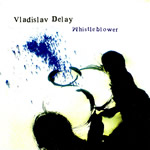|
|
 |
Dusted Reviews
Artist: Vladislav Delay Album: Whistleblower Label: Huume Review date: Jul. 25, 2007 |

|
|
|
 |
In electronic music, the phrase ‘return to form’ is a loaded compliment. Regardless of how good the album is, if it isn’t upping the ante in a meaningful way, the latest release becomes, at best, a place-holder, at worst an indulgence. Carsten Nicolai cannot go back to the well of process digi-funk, Richard D. James cannot play with 808s, and Jan Jelinek cannot overlay cluster-loops without a part of me wishing that they were exploring new territory. I suppose that this applies to art in general, but for a form that both necessarily thrives on innovation and, in inverse amounts, dates terribly (listen to Source Recordings records from the turn of the century), it’s all the more immediate.
So why is it that Vladislav Delay’s Whistleblower, an album I would comfortably describe as a return to form after two albums of sprawling dub excess, feels so rewarding? While Sasu Ripatti’s latest Luomo and Uusitalo releases sparkled, plumbing the depths of those guises in ways that both resonated with the initial blueprints and pushed forward, the last two Delay albums seemed to wander astray, gaining some accolades for testing the limits of ‘post-post-dub’ what-have-you but mostly failing to satisfy on the level that his early Chain Reaction and Mille Plateaux releases did. Those early albums sprawled, but did so with at least an eye batted towards the dancefloor. The hint of rhythm was always present, and they occasionally crossed the boundary into Uusitalo-style beatsmithing. Not really the case with Demo(n) Tracks or The Four Quarters, albums that, for all their painstaking detail and wondrous scope, lost whatever sense of fun that is present in the best of dub.
By the time the introductory ambiance of Whistleblower’s title track leads into the playful bounce of a track titled “(Wanted to) Kill,” it’s clear that we’re back in the world of Multila, where anything can happen and the lengthy running times unearth revelation rather than lay track for exploration. Delay is at the top of his game throughout – the monstrously thick bass, skittering organics that pop out of the mix, and beats that gel out of what only seemed incongruous all rear their heads. Each track bobs and weaves before hitting its stride, never outstaying its welcome.
Delay saves the best for last with “Recovery IDea,” a slow dub crawl that doesn’t let up its not-quite four-on-the-floor beat. It’s a return to what made Multila so exciting: this is dance music that is far too deep to dance to. Whistleblower may lack that album’s ability to astonish, but it’s a return to form informed by the landscape experimentation of recent efforts, and, as such, firmly places its best foot forward.
By Brad LaBonte
|







